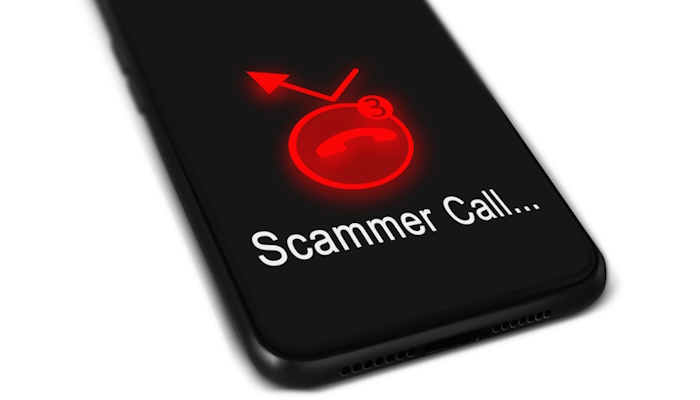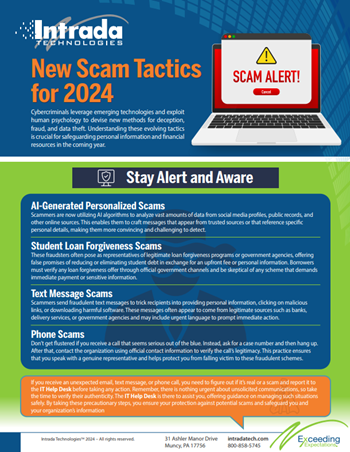Knowledge Base
New Scam Tactics for 2024
OVERVIEWAs technology advances, scam tactics become increasingly sophisticated. In 2024, individuals and businesses must stay vigilant against scams that leverage emerging technologies and human psychology to deceive and defraud. Understanding these new tactics is crucial for protecting personal information and financial resources. |
![]() As technology continues to advance, so do the tactics employed by scammers. In 2024, individuals and businesses must remain vigilant against increasingly sophisticated scams that target a wide range of vulnerabilities. Cybercriminals leverage emerging technologies and exploit human psychology to devise new methods for deception, fraud, and data theft. Understanding these evolving tactics is crucial for safeguarding personal information and financial resources in the coming year. In this article, we will explore some of the top new scam tactics for 2024 and provide tips for identifying and avoiding them.
As technology continues to advance, so do the tactics employed by scammers. In 2024, individuals and businesses must remain vigilant against increasingly sophisticated scams that target a wide range of vulnerabilities. Cybercriminals leverage emerging technologies and exploit human psychology to devise new methods for deception, fraud, and data theft. Understanding these evolving tactics is crucial for safeguarding personal information and financial resources in the coming year. In this article, we will explore some of the top new scam tactics for 2024 and provide tips for identifying and avoiding them.
AI-Generated Personalized Scams
 |
One of the most concerning advancements in scam tactics for 2024 is using AI (artificial intelligence) to create highly personalized messages. Scammers are now utilizing AI algorithms to analyze vast amounts of data from social media profiles, public records, and other online sources. This enables them to craft messages that appear from trusted sources or that reference specific personal details, making them more convincing and challenging to detect. For example, an AI-generated email might mention the recipient's recent online purchases, friends' names, or even upcoming events, adding a layer of authenticity. These personalized scams can be phishing emails, text messages, or even phone calls, and they often aim to extract sensitive information or encourage malicious actions. It is crucial for individuals to be wary of unsolicited communications and to verify the legitimacy of any request for personal or financial information.
Student Loan Forgiveness Scam
Another emerging scam tactic gaining traction in 2024 is the student loan forgiveness scam. As the conversation around student debt relief continues to dominate headlines, scammers are capitalizing on borrowers' hopes and financial struggles. These fraudsters often pose as representatives of legitimate loan forgiveness programs or government agencies, offering false promises of reducing or eliminating student debt in exchange for an upfront fee or personal information. They may use official-sounding titles, forged documents, and sophisticated websites to gain the trust of unsuspecting victims. It is essential for borrowers to verify any loan forgiveness offered through official government channels and to be skeptical of any scheme that demands immediate payment or sensitive information. Understanding the legitimate options for student loan forgiveness can protect individuals from falling victim to these deceitful practices and potentially losing money or compromising personal data.
Text Message Scams
In 2024, text message scams, also known as SMS phishing or "smishing," continue to be a prevalent threat to individuals and businesses. Scammers send fraudulent text messages designed to trick recipients into providing personal information, clicking on malicious links, or downloading harmful software. These messages often come from legitimate sources such as banks, delivery services, or government agencies. They may include urgent language to prompt immediate action.
One common variant of this scam involves receiving a text that claims your bank account has been compromised or that you have an unpaid bill that requires immediate attention. The message usually contains a link that directs you to a fake website meant to capture your login credentials, credit card information, or other sensitive data. In some cases, these scams can result in significant financial losses. The Federal Trade Commission (FTC) reports that in 2023 alone, consumers lost over $86 million to text message scams, highlighting the need for increased awareness and caution.
To protect yourself from falling victim to text message scams, be skeptical of unsolicited texts, avoid clicking on links from unknown senders, and verify the authenticity of any suspicious message by contacting the supposed source directly through official channels.
Phone Scams
Phone scams remain a significant concern in 2024, with scammers adapting new techniques to deceive their targets. These scams can range from impersonating government officials to tech support calls to steal personal information or extort money. One of the most prevalent phone scams is the IRS scam, where fraudsters claim to be Internal Revenue Service agents and threaten arrest unless immediate payment is made. Another common scam involves fake tech support calls, where scammers pose as representatives from well-known technology companies, warning the victim of a supposed virus on their computer and requesting remote access to "fix" the issue, often leading to financial theft or malware installation.
Top Types of Phone Scams
Government Impersonation Scams: Scammers pretend to be officials from agencies like the IRS, Social Security Administration, or local law enforcement, often employing scare tactics to prompt immediate action.
Tech Support Scams: Fake tech support representatives claim that your device is compromised and offer to resolve the issue for a fee or through remote access, which can lead to data breaches.
Prize or Lottery Scams: Victims are informed that they have won a substantial prize or lottery but must first pay taxes or fees upfront to claim their winnings.
Family Emergency Scams: Scammers imitate a distressed family member, often claiming to be in an urgent situation that requires immediate financial aid.
Stay calm if you receive a call out of the blue that seems serious. Instead, ask for a case number and then hang up. After that, contact the organization using official contact information to verify the call's legitimacy. This practice ensures that you speak with a genuine representative and helps protect you from falling victim to these fraudulent schemes.
Email Phishing
Last but certainly not least, a scam that we will discuss is email phishing. We cannot stress this enough - do not click on links in emails or open attachments in emails that you did not expect. Phishing emails are designed to look like they come from trusted sources, often mimicking the appearance of emails from banks, online retailers, or even friends and colleagues. These emails may contain links that direct you to malicious websites or attachments that install harmful software on your device.
Additionally, never provide or change any financial information via email. Always confirm any request for financial details or changes through a different method of communication to ensure its legitimacy. Contact the person or organization directly using official channels to verify suspicious emails. Vigilance and skepticism are your best defenses against falling prey to email phishing scams.
In Closing
If you receive an unexpected email, text message, or phone call and are unsure if it is real or a scam, report it to the IT Help Desk before taking action. Remember, there is nothing urgent about unsolicited communications, so take the time to verify their authenticity. The IT Help Desk is there to assist you, offering guidance on managing such situations safely. By taking these precautionary steps, you protect against potential scams and safeguard your and your organization's information.
Cybersecurity Awareness Poster 
 |
Click here for a cybersecurity awareness training poster that Intrada Technologies clients may print and post to meet cybersecurity insurance requirements. |
|
Contact Information: |
Hours of Operation: |
OUR FOCUS
Intrada Technologies is a full-service web development and network management company with a focus on creating ongoing, trusted partnerships with each of our clients.
We make sure our clients have what they require to run their businesses with maximum efficiency and reliability, as many of their needs are mission-critical.
Our unique, collaborative partnerships allow us to provide our clients with the assurance that we will be there when they need us.


